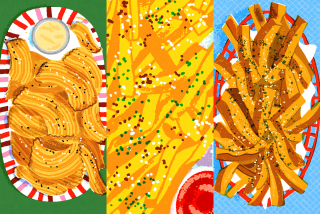Study of Suspected Carcinogen Rattles Snack Firms
- Share via
A new round of tests showing high levels of a suspected carcinogen in French fries, potato chips and other starchy snack foods is throwing a scare into the food industry.
Fearing panic among consumers and slumping sales, industry officials are conducting their own tests and putting out statements intended to calm fears that acrylamide, a substance that causes cancer in animals, might pose a human health risk in food.
The latest tests, conducted by the Center for Science in the Public Interest and disclosed Tuesday, echo findings of a Swedish government study in April that showed high levels of acrylamide--a substance used to make plastics and purify water--in French fries, potato chips and other starchy food cooked at high temperatures.
The World Health Organization is holding a special meeting of scientists this week at its Geneva headquarters to discuss results of research done in Sweden, Norway and Britain and set priorities for further research. It is expected to make recommendations Thursday to food agencies and consumers.
“We felt there was a real urgency to do something,” said Gregory Hartl, spokesman for the WHO. “There have been other studies that have found more or less similar findings” to the original Swedish government report.
Representatives of the U.S. Food and Drug Administration are attending the meeting, and FDA officials said they had begun testing for acrylamide in food from “a variety of products and sources.”
However, the agency said, it was not cautioning consumers to steer clear of any particular products.
Instead, until further recommendations from the WHO, the FDA is urging consumers to eat foods from a “wide variety of sources.”
The scare comes as French fry consumption already appears to be leveling off because of health concerns. French fry consumption had risen for much of the 1990s, with Americans eating an average of about 28 pounds per person each year. However, in the year ending June 30, consumption is expected to drop 1%, according to the U.S. Department of Agriculture. More bad health news could worsen what appears to be a growing glut of French fries.
The findings of the Swedish government study in April took the industry by surprise. Food companies have begun their own testing. Many also have found the chemical but have not found it in levels as high as those pinpointed overseas, said Gene Grabowski of the Grocery Manufacturers of America.
Acrylamide appears to be formed by a chemical reaction during cooking. The new study found high levels of acrylamide in starchy foods that were baked or fried at high temperatures, including cereal, taco shells and fries. Boiled potatoes did not contain the same high levels. Baked potatoes were not tested. More details on the study can be found at the Center for Science in the Public Interest’s Web site, www.cspinet.org.
The study of a dozen starchy food products showed that McDonald’s Corp. French fries have 72 micrograms of acrylamide per serving, 300 times the amount allowed by the Environmental Protection Agency for a single glass of water. (The EPA is the only U.S. agency that regulates acrylamide and then only in water.) Ore-Ida frozen French fries had 28 micrograms when baked and Fritos corn chips 11 micrograms.
However, what effect these levels of acrylamide have on human health is unknown, and therefore any warnings would be premature, said Timothy Willard of the National Food Processors Assn.
Snack food companies said tests should be done on a much wider range of foods. “Acrylamide has been found in a lot of other foods and beverages,” said Lynn Markley of Frito-Lay Inc.
Cooking many types of food at high temperatures can create carcinogens, experts say.
Most manufacturers, including Frito-Lay and H.J. Heinz Co., said they would wait for directives from the World Health Organization before they take any action.
Executives with McDonald’s declined to comment.
The center has begun to use the discovery to further its nutrition mission, urging consumers to cut back on starchy snacks.




